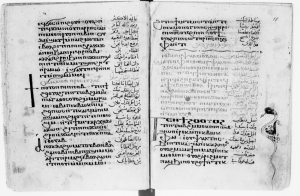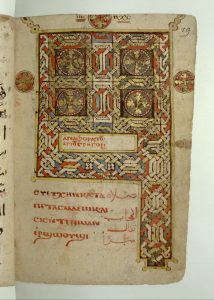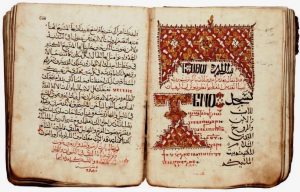The pinnacle of Orthodoxy is the Eucharist. The Eucharist was established by Christ himself and it is the fullness of our unification with God. It is therefore only fitting that the time in which we partake of the Body and Blood of our Lord is filled with praise and hymns. The Coptic Church has a specific structure and order for its distribution (communion) hymns.
Psalm 150
Regardless of the occasion, the first hymn chanted during the distribution of the holy mysteries is Psalm 150 (NKJV):
“Praise the Lord!
Praise God in His sanctuary*;
Praise Him in His mighty firmament!
2 Praise Him for His mighty acts;
Praise Him according to His excellent greatness!
3 Praise Him with the sound of the trumpet;
Praise Him with the lute and harp!
4 Praise Him with the timbrel and dance;
Praise Him with stringed instruments and flutes!
5 Praise Him with loud cymbals;
Praise Him with clashing cymbals!
6 Let everything that has breath praise the Lord.
Praise the Lord!”
* Note that the translation commonly used in Coptic parishes says, “Praise God in all his saints.” This is more of an allegorical interpretation, as the literal translation is literally “all the holy places.” It is meant to extend to God’s holy (chosen/consecrated) places/people.
The Coptic Rite also includes four extra pieces/verses after verse 6 of the Psalm. They are, “(1) Glory to the Father, and the Son, and the Holy Spirit, (2) Now and ever, and unto the ages of all ages. Amen, (3) Alleluia Alleluia, Glory be to our God [Greek], (4) Alleluia Alleluia, Glory be(longs) to our God [Coptic].
In my opinion, the use of Psalm 150 during the partaking of the mysteries is of significant value. In it, we call upon each human to offer praise to God, in whatever way he is able. It teaches each of us to use whatever talent, ability, virtue, or type of prayer we have to give thanks to the Almighty God who betrothed us to himself out of his own love.
Tradition
Originally, this hymn has four specific tunes that alternate based on the season/time in which the Eucharist is celebrated. This is denoted by Ibn Kabar in Mezbah el Zolma (Lamp in the Darkness) while discussing the rites of the Holy Liturgy. 
“Then the rest of the deacons chant Psalm 150 and it has tunes that alternate based on its time. (1) A hymn (tune) for the days, Sundays and Feasts, (2) a hymn for the middle of Friday [Friday in this case means the week], (3) a hymn for the weekdays of the holy 40 fast, and (4) a tune from “Moug” (an old Egyptian village) for Kiahk.”
The same idea is reiterated several times in the book Tarteeb el Bay3a (Order of the Church) compiled by Bishop Samuel of Shibeen el Qanatir. This book combines and compares the order and hymns of several different manuscripts across several different regions of Egypt. It includes portions from the following manuscripts:
- Patriarchal Archives of Cairo 1160 AM (1445 AD)
- Monastery of Al Baramous 1230 AM (1515 AD)
- Monastery of Saint Anthony 1377 AM (1662 AD)
- Monastery of Al Syrian 1414 AM (1699 AD)
- Patriarchal Archives of Alexandria 1432 AM (1717 AD)
- Monastery of Al Syrian 1435 AM (1720 AD)
- Church of Archangel Michael, Sbarbay, Egypt 1584 AM (1869 AD)
The dates are all written according to the Coptic calendar, signified by AM (ano martyri or the year of the martyrs).
- Kiahk (This photo is taken from the Section on the Paramoun of Nativity, in Tarteeb el Bay3a)

“The liturgy continues as usual, and at the time of communion of the holy mysteries after Alleluia in the tune of Kiahk, they chant”
2. Holy 40 Days of Lent (from Tarteeb el Bay3a)
“Liturgy is served until the end, then they chant Alleluia, Praise God and afterwards Blessed is in the tune of fasting and then Lover of Mankind.”
3. Sunday and Feast Day (Apostles’ Feast; from Tarteeb el Bay3a)
“The time of oblations, if the feast is a Sunday, they say Alleluia, Praise God in the tune of Sundays and Blessed are You in the tune of Sundays.”
4. Weekday (Apostles’ Feast; from Tarteeb el Bay3a)
“And if it is during the Friday (used here as the week) they chant: Alleluia, Praise God and Blessed is annually and then the aforementioned hymns until the end of communion.
From these references we can determine that in fact there were four original tunes for Psalm 150 during communion in the Coptic Orthodox Rite. This also alludes to other concepts that I will describe in later posts, including: Sundays being celebrated constantly as a festal occasion, as well as different tunes and rites being followed during the week.
Musical Characteristics
There are common traits and tunes amongst these four hymns. The first is a melismatic introduction to the psalm using the word Alleluia. The second trait is a distinct short/recitative tune for the verses of the psalm. The third characteristic is a melismatic conclusion that usually begins at the last two additional sections “Alleluia Alleluia Glory be to our God.” It is also evident that even groups of musical notes are shared among the hymns.
1. Annual Weekday Tune
- This is the original tune used during annual weekdays, even though it is now used for all annual days including Sunday.
- You can clearly hear: 1) the melismatic introduction, 2) the shorter verses of the psalm, and 3) the elongated conclusion (beginning at the last two sections). I would like to point out that the transition between the melisma and the verses is of extreme importance.
- The recording by Cantor Wadee3 of Tahta is very interesting because he uses another hymn, known as Alleluia of Vespers, as the conclusion of the communion hymn (rather than as the conclusion of Psalm 150 in the vespers praises’ Fourth Hoos). He is the only cantor to chant it during communion.
2. Lent Weekday Tune
https://soundcloud.com/dg920/sets/psalm-150-weekday-lent/s-gsgOw
Originally, the only difference between the lent weekday and annual weekday tunes was the introduction. After the introduction, the continuation of the hymn was chanted identically in both hymns.
- This is proven by Cantor Habib Hanna’s recording in which he continues the verses of the psalm during lent with the same tune as the annual weekdays.
- Cantor Wissa Attia’s recording also adds to the evidence, because when he transitions into the verses of the psalm, he starts in the annual tune, then tries to switch to the lenten tune, but does not alternate correctly so he uses the current Lenten weekend tune.
- Cantor Tawfik Youssef’s recording also reflects some confusion with the transition itself into another tune.
- Both the Higher Institute of Coptic Studies and Cantor Farag Abdelmessih end the introduction exactly the same way as the annual.
- The first cantor to conclude the melismatic introduction differently was Cantor Fahim Girgis, who was basically trying to perfect the transition into a newer tune. You can also see that Cantor Fahim did not record a refrain in the first recording for Jonah’s fast, but rather jumped into the next verse.
3. Kiahk Weekday Tune
The Kiahk tune of Psalm 150 for communion is one of the most beautiful pieces of music the Coptic Church has, in my opinion. In many instances you can see the joy on the chanters’ faces while they pray this hymn.
- In this tune there is also: 1) the common melismatic introduction, followed by 2) the verses of the psalm in a separate tune, and 3) an elongated conclusion which begins again just prior to the section “Glory be to our God.”
- Generally, the majority of this hymn’s melismatic introduction is also part of the hymn Alleluia of the Great Hoos.
- Cantor Fahim, and another hymnist from Alexandria named Mr. Moawad, used to take the tune of the elongated conclusion of this Kiahk communion hymn and use it during the midnight praises.
- Cantor Fahim kept the tune identical to that of communion, until he concludes the hymn in the midnight praises (the ending of the Fourth Hoos), where he changes the ending to that of another hymn in the midnight praises.
- Mr. Moawad, however, chants Alleluia of Vespers instead of the normal tune for the final section of the Fourth Hoos in the midnight praises.
After comparing all the common traits and the exceptions between these three tunes, you’re probably wondering:
4. “Well, where is the fourth hymn?”
The truth is, the tune for Psalm 150 chanted on Sundays and Feasts is now lost, and this has caused major confusion and discrepancy.
- Cantors began taking other tunes already in use for the wados doxologies, sherat, and melodies, and using them during each respective season. They fit them onto the verses of Psalm 150 without properly understanding the system that existed for Psalm 150. The wados tunes are used in a four stanza verse with eight syllables to a piece, give or take.
- Because the number of syllables in each verse of the Psalm were too little to fit the musical structure of the borrowed tunes, they began to create refrains in between each verse to fill the musical gap. When the length of time during the distribution (communion) began to increase (due to the growing congregation), the cantors decided to lengthen the introductory verses by using the melismatic form of the tune they borrowed.
- This resulted in the current Psalm 150 tunes and refrains for the feasts of the Lord, the two feasts of the Cross, the month of Kiahk, and for the weekdays and weekends of lent.
Therefore, technically speaking, there should be no refrains for any Psalm 150 communion hymn, and they were never supposed to be matched to the tunes of the wados doxologies, sherat, or melodies. With this understanding, we reach two important points.
- Since each tune used for the feasts of the Lord (and the other instances as aforementioned) during the year was recently fabricated, there is no purpose for arguing over a “proper way” to chant them. In recent years there has been much tumult and confrontation on this subject. Unless someone has an extremely rare and old recording of the original festal psalm 150, it is up to the cantor or chorus, to an extent, to determine how to chant the hymn.
- It may be necessary at some point in the future for the Church to train Coptic musicologists and create a hymn using similar music as the tunes that already exist so as to remove any discrepancy and restore some of the order that was originally placed. This would inherently rid us of creating new responses and releasing new decisions every so often. Of course this would take years of study and proactivity, but I believe it is time that we begin rebuilding some of our rites using the talent that God has given the members of our Church.
Personal Contemplation
Lord, you are deserving of more praise than I could ever offer. Please accept my humble gifts, as I use whatever you’ve given me to thank you. Allow me to partake of your holiness, Lord, regardless of the weaknesses in my life. Help me to cherish every moment spent with you and to value your sacrifice on the cross for my sake. Restore me, Lord, and wash my iniquities through your holy body and blood. Let all creation proclaim your holy name and give you glory for your work with mankind. “Let every breath and all that I am never cease to worship you, Lord.” Amen





